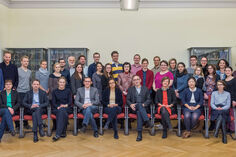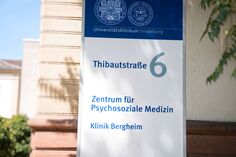Working Group Personality Disorders
Main topics
Social interactions in personality disorders
Our goal is to investigate the neurobiological and psychological basis of social interaction disorders, as these are a central feature of various personality disorders. On the one hand, we are interested in basal psychological functions such as social cognitive capacities, emotional regulation and emotional impulse control in order to gain a better understanding of maladaptive social behavior such as social avoidance or aggressiveness. To this end, we pursue a translational approach that combines multimodal imaging (MRI) and neuropeptides with phenomenological psychopathology and developmental psychology in experimental paradigms. In addition to a better understanding of the underlying mechanisms, this line of research aims at the development and establishment of new diagnostic tools and individualized therapeutic interventions. To this end, we conduct randomized controlled psychotherapy studies and pharmacological intervention studies.
Influence of traumatic childhood experiences on social cognition and interactions
Traumatic childhood experiences such as abuse or neglect before the age of 18 can have not only immediate but also massive long-term consequences for those affected. Among other things, they increased the risk of becoming mentally ill at some point in life. In our research group we investigate the effects of traumatic childhood experiences on the processing and perception of interpersonal information. On the one hand, we aim to identify and explain disorder-spanning and specific trauma-associated changes in social cognition. On the other hand, we investigate the effects of traumatic childhood experiences on the relationship with one's own children. In addition to a better understanding of the underlying neurobiological correlates, we develop and test new therapeutic interventions to improve the parent-child relationship and thus contribute to the prevention of mental illness in the next generation.
Methodical focus
- Structural and functional magnetic resonance imaging
- Psychoneuroendocrinology
- Psychophysiology (electrodermal activity, electrocardiography, electromyography)
- Neurophysiology (electroencephalography, event related potentials)
- Eyetracking
- Experimental Psychopathology
- Phenomenology
- Neuropsychology
Team
Research Group Leaders
Scientific Staff
-

Dr. med. Berdina-Noelle Trulley
Publications
Current studies
- UBICA-2: Understanding and Breaking the Intergenerational Cycle of Abuse in Families enrolled in Routine Mental Health and Welfare Services
- Transdiagnostic and disorder-specific alterations in social-cognitive functional domains in highly comorbid psychiatric disorders associated with trauma in childhood and adolescence (GRK 2350: Studie C1)
- Modular psychotherapy for patients with comorbid depression and a history of early traumata
- Central oxytocin effects in acute and chronic pain (SFB1158 (Studie B02)
- Hypersensitivity to Social Threat, Anger and Aggression in Borderline Personality Disorder II
more information - Biobehavioral mechanisms of reactive aggression in borderline personality disorder: validation and pharmacological modulation
more information - Neural Mechanisms of Moral Action
- Neuronal and hormonal mechanisms in the mother-child relationship in borderline personality disorder










